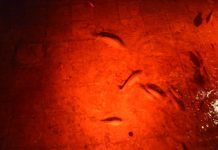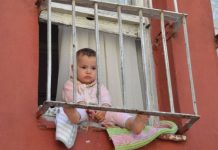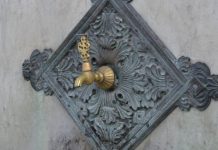Having re-arranged the whole army in this manner, he himself started along the seacoast in order to attack the Frankish army from the front. The barbarians appointed for the rear attack, after passing through the salt-pits, made an assault upon the Frankish camp in conjunction with the garrison of Dyrrachium, who by the Emperor’s command had opened their gates. As the two leaders were marching against each other, Robert ordered groups of cavalry to harass the Roman troops and thus perhaps draw away some of them. But even in this detail the Emperor did not fail, for he kept on sending large numbers of light-armed troops to oppose them.
Then after a little preliminary skirmishing on either side, as Robert was leisurely following his men, and the distance between the armies was by now fairly short, some infantry and cavalry belonging to Amicetas’ phalanx dashed out and attacked the extremities of Nabites’ line.
These however, resisted the attack very stoutly, so the others turned their backs (since they were not all picked men), threw themselves into the sea, and up to their necks in water, made their way to the Roman and Venetian ships and begged them for protection, which they did not receive. And now, as rumour relates, directly Gaïta, Robert’s wife (who was riding at his side and was a second Pallas, if not an Athene) saw these soldiers running away, she looked after them fiercely and in a very powerful voice called out to them in her own language an equivalent to Homer’s words, ” How far will ye flee ? Stand, and quit you like men! ” And when she saw they continued to run, she grasped a long spear and at full gallop rushed after the fugitives; and on seeing this they recovered themselves and returned to the fight.
Meanwhile the axe-bearing barbarians and their leader Nabites had in their ignorance and in their ardour of battle advanced too quickly and were now a long way from the Roman lines, burning to engage battle with the equally brave Franks, for of a truth these barbarians are no less mad in battle than the Franks, and not a bit inferior to them. But they were already tired out and breathless, Robert noticed, and naturally so he thought, considering their rapid advance, their distance from their own lines and the weight of their weapons, and he ordered some of the foot to make a sudden attack on them.
The barbarians having been previously wearied out, proved themselves inferior to the Franks, and thus the whole corps fell; a few escaped and took refuge in the chapel of Michael, the ‘Captain of the Host,’ as many as could crowded into the chapel itself, and the rest climbed on to the roof, being likely in this way, they imagined, to ensure their safety. But the Latins started a fire and burnt them down, chapel and all. Meanwhile the rest of the Roman army fought on bravely.
But Robert like a winged horseman, dashed with his forces against the Roman phalanx, drove it back and split it up into several fragments. Consequently some of his opponents fell fighting in this battle, and others ensured their own safety by flight. But the Emperor Alexius stood fast like an impregnable tower, although he had lost many of his comrades, men pre-eminent for their birth or military skill.
For instance, Constantius fell there, the son of the ex-Emperor, Constantine Ducas, not born while his father was still a private man, but born and reared in the purple and deemed worthy formerly by his father of the royal fillet. There fell too Nicephorus by name, but nicknamed Synadenus, a brave and very handsome man who strove to surpass all in fighting on that day. With him the aforementioned Constantius had often spoken about marrying his sister. Nay, Nicephorus the father of Palaeologus, and other well-known men fell too, and Zacharias received a blow in the chest which cost him his life.
Amicetas missed the Emperor
Aspietes and many other picked men also perished. The battle did not come to an end because the Emperor still maintained his resistance, therefore three of the Latins, one of whom was Amicetas already mentioned, the second Peter, son of Aliphas, as he himself asserted, and a third, not a whit inferior to these two, took long spears in their hands and at full gallop dashed at the Emperor. Amicetas missed the Emperor because his horse swerved a little; the second man’s spear the Emperor thrust aside with his sword and then bracing his arm, struck him on the collarbone and severed his arm from his body.
Then the third aimed straight at his face, but Alexius being of firm and steadfast mind was not wholly dismayed, but with his quick wit grasped in the flash of an instant the thing to do, and when he saw the blow coming, threw himself backwards on to his horse’s tail. Thus the point of the spear only grazed the skin of his face a little and then, hitting against the rim of the helmet, tore the strap under the chin which held it on and knocked it to the ground. After this the Frank rode past the man he thought he had hurled from his horse, but the latter quickly pulled himself up again in his saddle and sat there calmly without having lost a single weapon.
Read More about The Emperor more subtle and more clever








